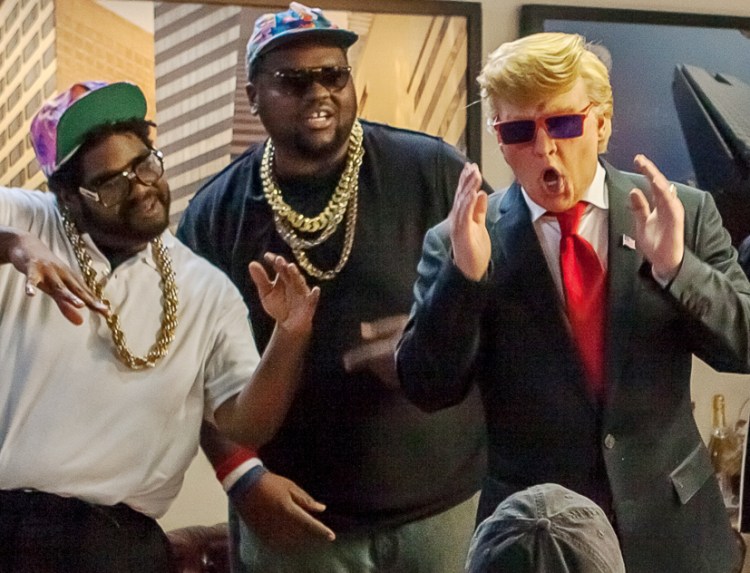If you think you’ve had a lot of Donald J. Trump exposure lately, try being Joe Randazzo.
The former editor of the Onion, Randazzo spent months last year immersed in the collected clips and writings of the GOP front-runner, turning it into a 1980s-set parody script for the website Funny or Die.
“I was ready,” he recalled dryly, “to jump off a bridge.”
But that work paid dividends. Americans who went to bed Tuesday night after watching cable news coverage of Trump’s New Hampshire primary triumph awakened to a different kind of entertainment Wednesday morning, courtesy of Trump in the guise of Johnny Depp.
Funny or Die had offered a kind of February surprise, dropping the parody film “Donald Trump’s The Art of the Deal: The Movie” on an unsuspecting Web public. The release quickly prompted a viral frenzy on social media, but no response — yet — from @realdonaldtrump himself.
If you haven’t watched it yet, the 50-minute “biopic” is designed to look like a movie of the week from the 1980s (according to the parody, it was lost then but is newly recovered after being wrestled from a woman named Ginny at a garage sale by Ron Howard). Trump himself is presented as its director, writer, producer and — of course — star.
The film is structured around the pseudo-principles allegedly in Trump’s titular 1987 bestseller — “The art of buying a hotel from the Hilton family,” “The art of marrying a gorgeous immigrant” — and follows the tycoon as he narrates a number of actual anecdotes from the book to a young boy, peppering them with his trademark superlatives like “sensational” and end-of-sentence uptalked “OKs?”
Trump is seeking to buy the Atlantic City casino the Taj Mahal from Merv Griffin (Patton Oswalt), which gives him a chance to walk through various moments of his life, both the real (his suit against the NFL and the purchase of air rights in midtown Manhattan) and the fictional. “Mr. Gorbachev, tear down this wall — I can build you a much nicer one,” he says in one phone conversation.
The protagonist is often articulating his beliefs. “Everyone, no matter of race, age, creed color,” he says in a real-estate bit, has the right to “be priced out of their own neighborhood.” At various points, the mogul, as director, also relieves several kids of their listening duties when he realizes they have minority backgrounds.
He eventually settles on “The Room’s” Jacob Tremblay, who listens gamely and does not comment on whether the experience of being trapped in a room with Trump is better or worse than his other recent appearance of on-screen claustrophobia.
Touches from the 1980s abound in the film, including an Alf cameo and a keyboards-heavy score to a “Dynasty”-inspired montage. But even though it’s set in the Reagan era, a potential Trump presidency figures in via an ’80s-flavored time-travel device; there are even references to the nuclear codes (“You can demolish a lot of buildings with that”). Also, Carmen Electra is alluded to as a key Cabinet member.
When the movie was shot in the fall, no one working on the production had any idea how much further Trump’s campaign could go. It’s obviously still going strong, which led to a problem: Truth was becoming more satiric than fiction.
“When we set out to make this film three months ago, this seemed like a much more scathing attack,” said the director, Jeremy Konner (“Drunk History”). “And what has come out of his mouth since then is a thousand times more insane than anything we might have fictionalized.”
Randazzo said “a lot of revisions” had to happen to ensure that the rhetoric in the film kept pace with what Trump was saying on the stump.
Setting it in the past also offered a certain kind of insight. “There were moments in the book when he still seemed a little human — arrogant but still likable,” Randazzo said.
The larger idea for a Trump parody was conceived by Funny or Die editor in chief Owen Burke, one of the film’s executive producers. The site was founded by Will Ferrell, Adam McKay and Judd Apatow, with McKay himself in a humor-activist realm at the moment with his Wall Street black comedy “The Big Short” nominated for Oscar’s best picture.
Still, filmmakers say they have only modest hopes for how much they can affect the presidential race.
“I don’t think we can really sway anyone — the people that love him won’t have their minds changed by something like this, and the people that hate him already hate him,” said Randazzo.
Added Konner: “This is not propaganda — it’s entertainment and comedy, first and foremost. But the reality is that all the people involved in making this think Trump is a clown, a comical character who should not be president of the United States. That point of view is inescapable in the art we make.”
Which raises another question: Given Trump’s continuing ascent in pursuit of that office, might there be a possibility of a sequel?
“I don’t think any of us want to put ourselves through this again,” Randazzo said.
Send questions/comments to the editors.



Success. Please wait for the page to reload. If the page does not reload within 5 seconds, please refresh the page.
Enter your email and password to access comments.
Hi, to comment on stories you must . This profile is in addition to your subscription and website login.
Already have a commenting profile? .
Invalid username/password.
Please check your email to confirm and complete your registration.
Only subscribers are eligible to post comments. Please subscribe or login first for digital access. Here’s why.
Use the form below to reset your password. When you've submitted your account email, we will send an email with a reset code.